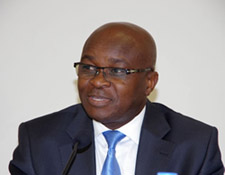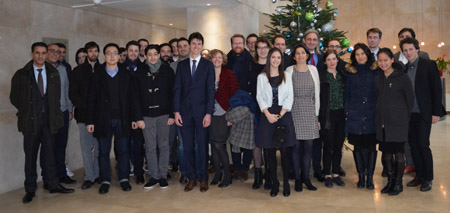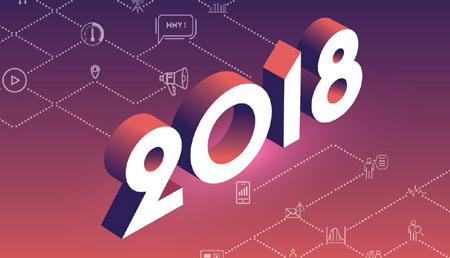 |
Regulation in action
Transition to IPv6: increasing transparency to accelerate the process
Arcep has published its annual scoreboard on the transition to IPv6. In keeping with its data-driven approach to regulation, it includes a status update, information on past developments and forecasts for operators’ expected short and medium-term deployments. And, for the first time, the scoreboard also now includes data collected directly from ISPs.
Where are we now?
As it stands, Free and Orange have taken the lead with a 35% and 33% rate of use for IPv6, respectively – i.e. the percentage of internet traffic that is IPv6 traffic, as actually logged by the servers hosting content at the end of the chain – whereas Bouygues Telecom and SFR are at less than 1%.
And by 2020?
ISPs plan on accelerating the pace of the transition on fixed networks. By 2020, the percentage of customers who actually transmit and receive IPv6 traffic will stand at: 95% to 100% for Free, between 75% and 85% for Bouygues Telecom, and between 70% and 80% for Orange, compared to 10% to 20% for SFR*. On mobile networks, the process is only just beginning: most operators report that they have begun conducting trials for migrating to IPv6.
Why accelerate the transition?
If the transition to IPv6 is inevitable, for France it also vital to unleashing innovation and competitiveness. By providing users and website publishers with more freedom, IPv6 allows them to no longer be burdened by the limitations created by the dearth of IPv4 addresses, and so to decide freely on tomorrow’s innovations.
*Projections; figures likely to change.
Find out more
IPv6 scoreboard (in French)
|  |
 |
|
On our radar
| |
Diéméléou BILE, new president of FRATEL
The Director-General of the Telecommunications regulatory authority of Côte d’Ivoire (ARTCI) has just been appointed the 2018 president of FRATEL, the network of French-speaking telecoms regulators. Arcep Chairman Sébastien Soriano is the new vice-president, and will take over as head of the network in 2019.
| 
|
|
| |  | |
News from around the world
Net neutrality: the FCC backtracks
On 14 December, US electronic communications regulator, the Federal Communications Commission (FCC), decided to put an end to net neutrality in the United States, through a decision entitled, “Restoring Internet Freedom”. Under this new scheme, only ISPs’ obligation be transparent about their practices remains, and they will now be supervised by the Federal Trade Commission (FTC).
In India on the other hand, on 28 November the Telecom Regulatory Authority of India (TRAI) adopted a series of recommendations aimed at strengthening net neutrality, which are very close to the European regulation of 2015, ensuring a more open internet in the EU.
- European Open Internet regulation will protect Europeans – Statement by Andrus Ansip, Commission Vice-President for the Digital Single Market (in French)
- “Europe has a message for Americans on Net neutrality” – Op-ed by Arcep Chairman and BEREC Chair Sébastien Soriano in Slate US
- “Net neutrality means no censorship” – Sébastien Soriano answers questions from Usbek & Rica (in French)
- “Killing net neutrality would be a sad turn of events” – Sébastien Soriano interviewed in l’Obs (in French)
- “Net neutrality means having access to the real internet ” – Sébastien Soriano interview with Meta-Media (in French)
- “The internet in France is more neutral than it is elsewhere” – Sébastien Soriano interview in Le Monde (in French)
- Interview with Sébastien Soriano in “Les Matins de France Culture” (in French)
|
| |
 |
Arcep, telling it like it is
 Market analyses: decisions that mobilise half of Arcep’s staff Market analyses: decisions that mobilise half of Arcep’s staff
In 2017, Arcep adopted six market analysis decisions. For a period of three years, these decisions structure and adapt regulations governing several markets:
- Fixed broadband and superfast broadband (residential and business market);
- Fixed calling;
- Fixed call termination;
- Mobile call termination.
A minimum nine months of preliminary work is required to produce each decision: drafting “Current status and future outlook” documents (published for public consultation), writing and editing the draft decisions, which are also submitted for public consultation, then notification of the “final” decisions to the European Commission. No fewer than 90 Arcep staff members are involved in this work: technical departments (mobile, fixed, internet) but also more cross-disciplinary departments whose work is equally vital: the departments responsible for economic and legal analysis, and for European affairs.
Market analyses, by the numbers:
- 6 decisions;
- 614 pages of decisions;
-13 public consultations;
- 70% of Arcep’s staff mobilised;
- Hours of meetings, hours of writing and editing, hours of discussion between the Executive Board and the departments, then a great deal of discussion amongst Board members;
- And more than a few litres of coffee!
Arcep’s market analyses at a glance (in French)
|  |
 |
17 January 2018 in Paris

Arcep’s New Year’s message
Arcep will deliver its New Year’s message for 2018 at 6 pm on 17 January, at La Sorbonne, with special guest Pierre Moscovici, European Commissioner for Economic and Financial Affairs.
By invitation only – Subject to available space
|  |
 |
20 December 2017 / 10 and 24 January 2018
[French Tech Central] Arcep at Station F to answer start-ups’ questions
Arcep is one of the 30 administrations on hand at Station F via French Tech Central. Are you interested in our “regulatory sandbox”? In using spectrum and numbering resources for your trials? Arcep is here to answer all of your questions and to help walk you through steps!
Find out more
30 and 31 January 2018 in Paris
API Days Paris
Application Programming Interfaces (API) have their own conference! For six years now, developers and public IT have been meeting at APIDays. Next year’s edition will be taking place in Paris on 30 and 31 January. Arcep will be there to talk about the work it is doing on how devices influence open internet access.
Find out more
13, 14 and 15 February 2018 in Valencia, Spain
FttH Conference
Fibre industry stakeholders are invited to come to Valencia in February for the FttH Conference. With 3,000 participants from more than 90 countries, the FttH Conference is a key event for those interested in this topic.
Find out more
15 February 2018 in Paris
“Smartphones, tablets, voice assistants... Are devices the weak link in achieving an open internet?” event
In 2017, Arcep kicked off a period of investigation into devices and open access. It is currently holding (until 10 January) a public consultation on several courses of action that it wants to assess. Arcep will then release an in-depth report at an international event in Paris on 15 February 2018.
| |

 |
|  |
|

